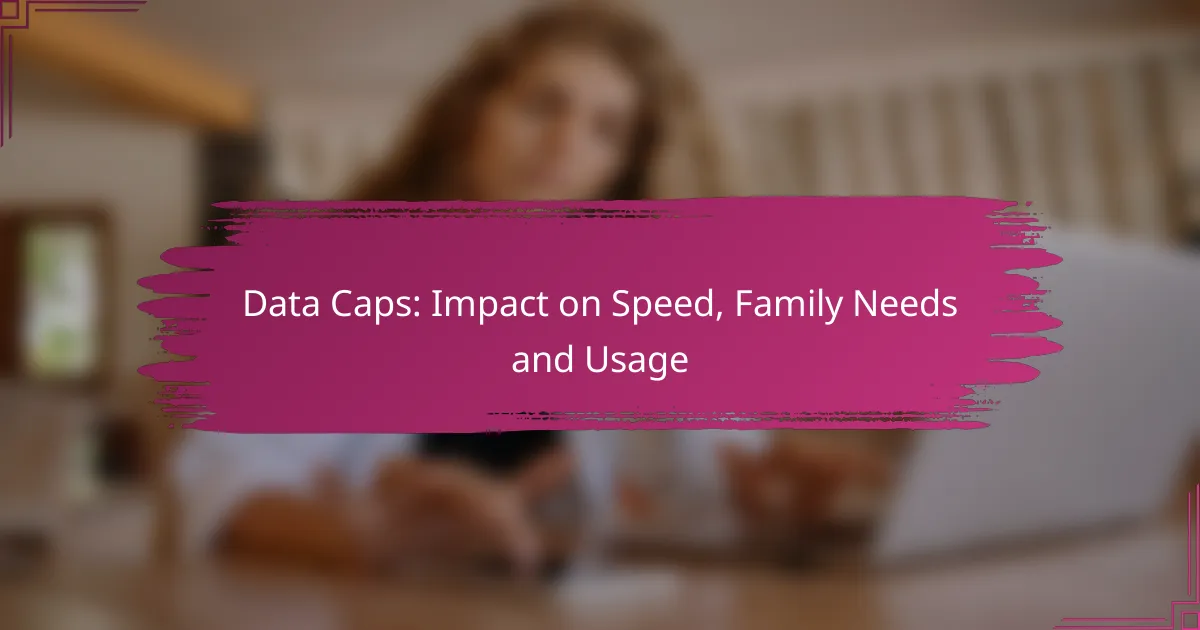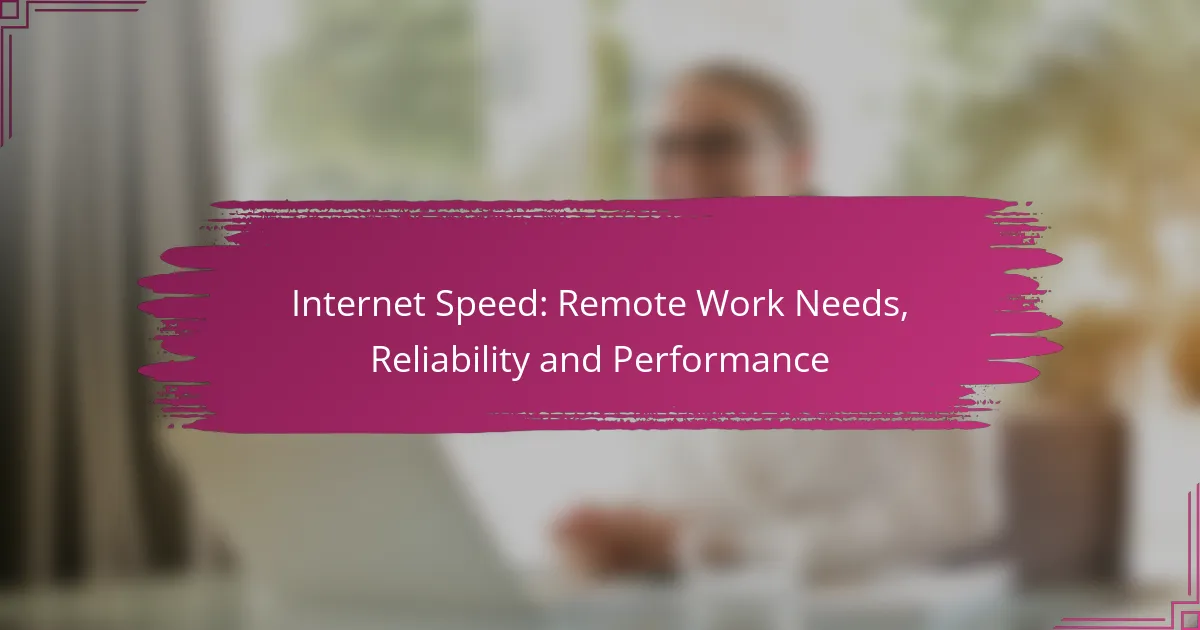Data caps can greatly influence internet speed and overall user experience, particularly for families with diverse online needs. When users exceed their data limits, connection speeds may be throttled, leading to slower performance and potential additional charges. It is essential for families to assess their internet usage patterns and select plans that align with their lifestyle to avoid disruptions and extra costs.
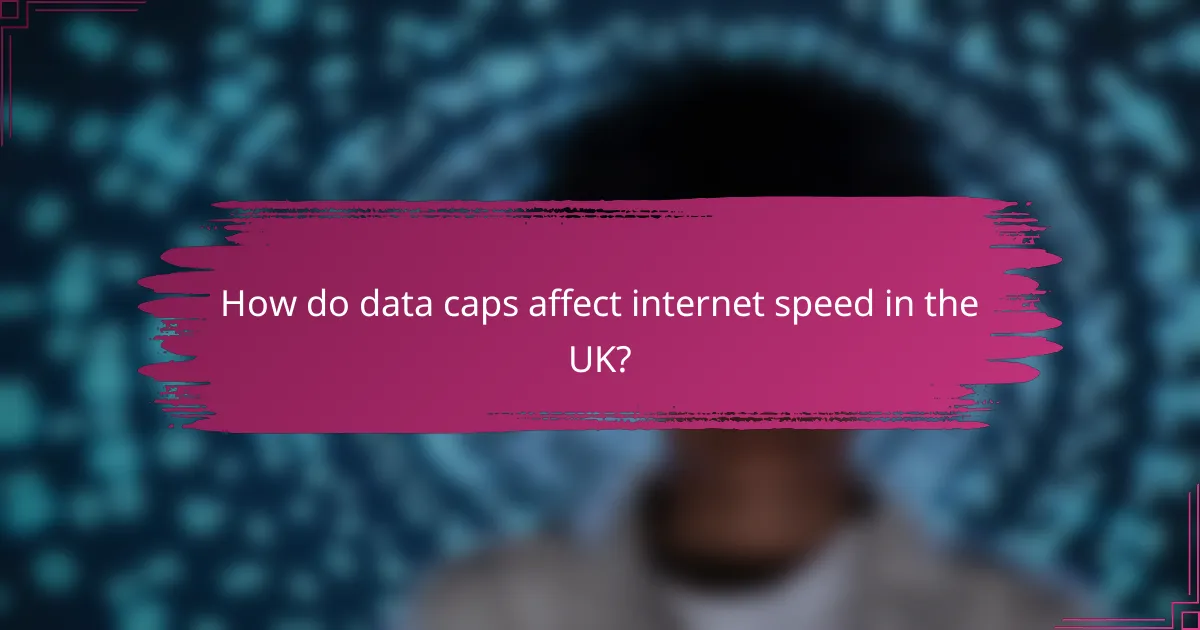
How do data caps affect internet speed in the UK?
Data caps can significantly impact internet speed in the UK by throttling connection rates once users exceed their allotted data limit. This reduction in speed can hinder online activities, making it essential for families to understand their usage patterns and choose plans that meet their needs.
Reduced speeds after reaching data cap
Once a household surpasses its data cap, internet service providers (ISPs) typically reduce speeds to a fraction of the original rate. This throttling can result in speeds dropping to as low as a few hundred kilobits per second, which is insufficient for most online tasks. Families should monitor their data usage to avoid hitting these limits and experiencing slowdowns.
Many ISPs in the UK offer plans with different data allowances, so it’s wise to compare options. Choosing a plan with a higher data cap or unlimited data can help maintain consistent speeds throughout the month.
Impact on streaming quality
Data caps can severely affect streaming quality, particularly for high-definition content. Once the cap is reached, streaming services may automatically reduce video quality to conserve data, resulting in a less enjoyable viewing experience. For instance, a family accustomed to watching 4K content may find themselves downgraded to standard definition.
To mitigate this issue, families should consider their streaming habits and select plans that align with their viewing needs. Utilizing data-saving modes on streaming platforms can also help manage usage without sacrificing too much quality.
Effects on online gaming performance
Online gaming can be adversely affected by data caps, especially if speeds are throttled after reaching the limit. Games often require stable and fast connections to function optimally, and reduced speeds can lead to lag, latency, and disconnections. This can be particularly frustrating during competitive play.
Gamers should be aware of their data consumption, as some games can use significant amounts of data for updates and online play. Opting for plans with higher data caps or unlimited options can help ensure a smoother gaming experience without interruptions.
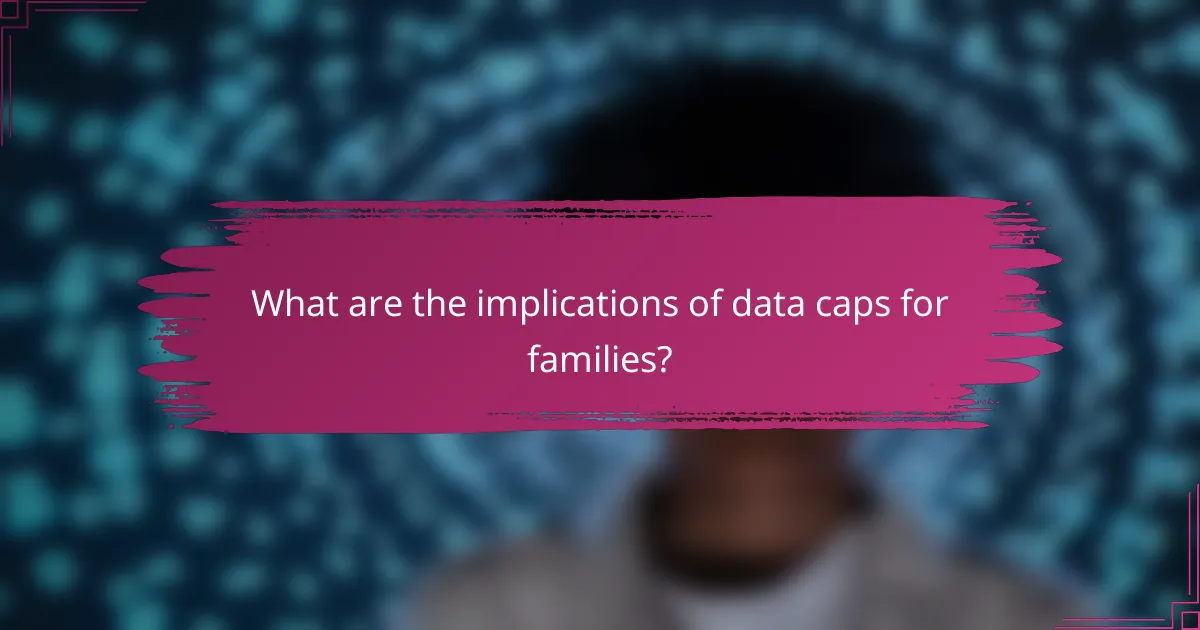
What are the implications of data caps for families?
Data caps can significantly affect families by limiting their internet usage, which may lead to slower speeds or additional charges. Understanding these implications is crucial for managing household internet needs effectively.
Data usage patterns in households
Households typically have diverse data usage patterns, influenced by activities such as streaming, gaming, and remote work. Families may consume anywhere from a few hundred gigabytes to several terabytes per month, depending on the number of users and their online habits.
Streaming high-definition video can use up to 3 GB per hour, while online gaming may consume less, around 1-2 GB per hour. Recognizing these patterns helps families anticipate their data needs and avoid overages.
Managing multiple devices and users
With multiple devices connected to the internet, managing data usage becomes essential. Families often have smartphones, tablets, laptops, and smart TVs all accessing the network simultaneously, which can quickly deplete data allowances.
Implementing parental controls and usage monitoring tools can help families track data consumption across devices. Setting limits on streaming and downloads during peak usage times can also alleviate bandwidth strain.
Strategies for families to optimize usage
To optimize data usage, families can adopt several strategies. Scheduling high-data activities, like software updates or large downloads, during off-peak hours can help conserve data during busy times.
Utilizing Wi-Fi whenever possible, especially for streaming and downloads, can significantly reduce mobile data consumption. Additionally, families should consider upgrading to higher data plans if their usage consistently exceeds current limits, as this can be more cost-effective than paying for overages.

How can you choose the right internet plan with data caps?
Choosing the right internet plan with data caps involves understanding your family’s usage needs and the limits set by various providers. Consider factors like the number of devices connected, streaming habits, and online activities to find a plan that suits your lifestyle without incurring extra fees.
Comparing plans from major UK providers
When comparing plans from major UK providers, look at the data caps they offer and how they align with your family’s internet usage. Providers like BT, Virgin Media, and Sky have different packages, often ranging from 100 GB to unlimited data. Assess the monthly costs and any promotional offers that may apply.
For example, BT offers a plan with unlimited data for around £30 per month, while Virgin Media may have a similar plan at a higher price point. Check for any additional benefits, such as free installation or included equipment, which can add value to your choice.
Evaluating data cap limits
Data cap limits can significantly impact your internet experience, especially for families with multiple users. Plans typically range from low caps of around 50 GB to unlimited options. Evaluate your household’s activities—streaming, gaming, and remote work—to determine how much data you realistically need.
A good rule of thumb is that streaming in HD can use about 3 GB per hour, while online gaming might consume less than 1 GB per hour. If your family frequently streams movies or has multiple devices connected, opting for a higher data cap or an unlimited plan could prevent overage issues.
Understanding overage fees
Overage fees can quickly add up if you exceed your data cap, so it’s crucial to understand how they work. Many providers charge a fixed fee for each additional GB used, which can range from £5 to £15 depending on the plan. This can lead to unexpected costs if your usage spikes.
To avoid overage fees, monitor your data usage regularly through your provider’s app or website. Some providers offer alerts when you approach your limit, allowing you to adjust your usage or upgrade your plan if necessary. Consider plans with no overage fees or those that automatically throttle speeds instead of charging extra, as this can provide a more predictable internet experience.

What are the alternatives to data-capped internet plans?
Alternatives to data-capped internet plans include unlimited data options, fibre-optic services, and mobile data plans without caps. These alternatives can provide more flexibility and better accommodate high usage needs for families and individuals.
Unlimited data plans in the UK
Unlimited data plans in the UK offer consumers the freedom to use the internet without worrying about data limits. Providers like BT, Virgin Media, and Sky offer various packages that include unlimited downloads, typically at competitive monthly rates.
When choosing an unlimited plan, consider the speed offered, as some plans may throttle speeds after a certain usage threshold. Always check the fine print for any potential restrictions or fair usage policies that may apply.
Fibre-optic options for high usage
Fibre-optic internet is an excellent choice for households with high data usage, providing faster speeds and more reliable connections. Providers such as Openreach and Hyperoptic offer fibre-optic services that can handle multiple devices streaming, gaming, and working from home simultaneously.
When selecting a fibre-optic plan, look for options that specify download and upload speeds, as these can vary significantly. Plans offering speeds of 100 Mbps or higher are generally suitable for most families.
Mobile data plans without caps
Mobile data plans without caps allow users to access the internet on their smartphones or tablets without worrying about exceeding data limits. Major carriers like Vodafone, EE, and O2 in the UK offer unlimited mobile data plans, which can be particularly useful for families on the go.
While these plans provide flexibility, consider the network coverage and speed in your area. Additionally, check for any restrictions on tethering or using mobile data for home internet needs, as some providers may impose limitations.
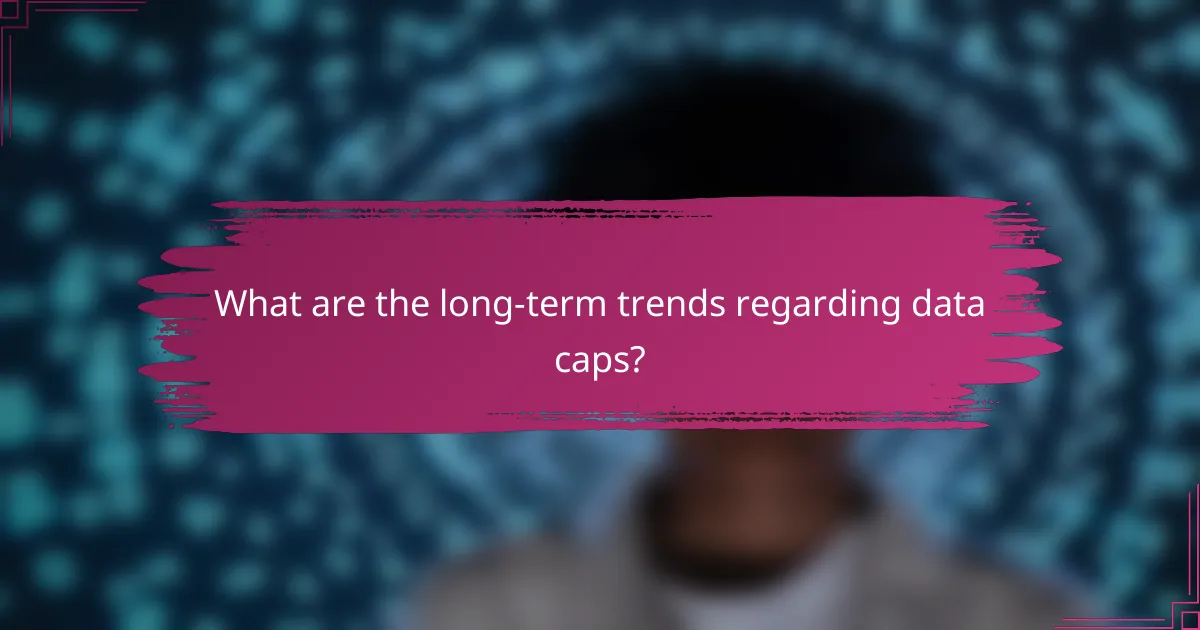
What are the long-term trends regarding data caps?
Long-term trends indicate a gradual shift away from data caps as consumer demand for unlimited data increases. Many internet service providers (ISPs) are responding to this demand by offering more flexible plans, reflecting changing usage patterns and technological advancements.
Shifts in consumer demand for unlimited data
Consumers are increasingly favoring unlimited data plans due to the rise in streaming services, online gaming, and remote work. This shift is driven by the need for reliable, high-speed internet that can support multiple devices simultaneously. As families and individuals consume more data, ISPs are adapting their offerings to meet these needs.
Many users are willing to pay a premium for unlimited access, leading to a decline in the popularity of capped plans. This trend is particularly evident in urban areas where high-speed internet is essential for daily activities.
Potential regulatory changes in the UK
In the UK, there are ongoing discussions about regulating data caps to ensure fair access to the internet for all consumers. The government is considering measures that could limit the ability of ISPs to impose restrictive data caps, especially in areas with limited competition. This could lead to more transparent pricing and better options for consumers.
Regulatory changes may also encourage ISPs to invest in infrastructure improvements, ultimately enhancing service quality and availability. Consumers should stay informed about these developments, as they could impact pricing and service options in the near future.
Emerging technologies affecting data usage
Technological advancements, such as 5G and fiber-optic networks, are significantly influencing data usage patterns. These technologies provide faster speeds and greater capacity, allowing users to consume more data without the constraints of traditional caps. As these networks become more widespread, the demand for unlimited data is likely to grow.
Additionally, innovations in data compression and cloud computing are enabling more efficient data usage, which may reduce the perceived need for strict data caps. Consumers should consider how these emerging technologies can enhance their internet experience and potentially lower costs in the long run.
